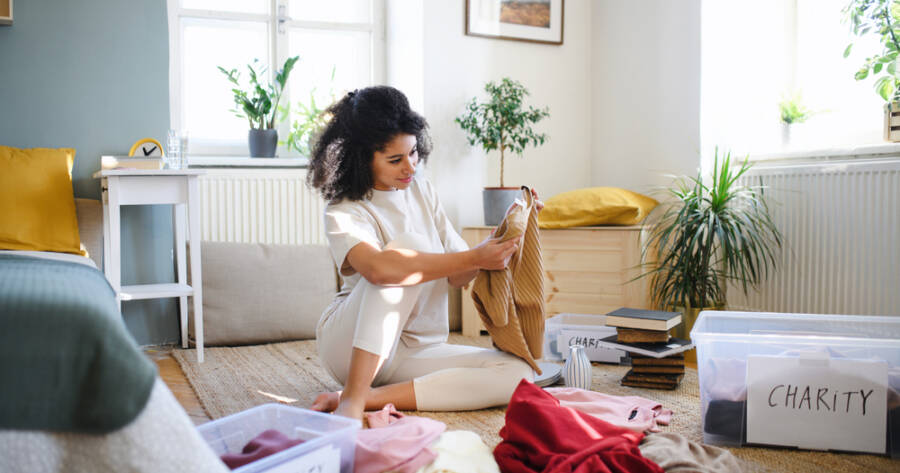The idea of living with less has gained momentum, but minimalism isn’t just about neat spaces and fewer possessions. It’s about freeing yourself from the weight of what you don’t need—physically and emotionally. For many, embracing minimalism leads to better mental clarity, reduced stress, and a more meaningful life rooted in intention rather than excess.
The Clutter-Stress Connection
Most people don’t realize how much their environment influences their emotional state. Studies have shown that cluttered spaces can increase levels of cortisol, a stress hormone, especially in women. A crowded room full of things you don’t use or need can make it harder to relax, focus, or feel in control.
By contrast, an organized, open space can make you feel lighter. When your home feels calm, your mind often follows. Minimalism helps reduce visual noise, which allows the brain to rest instead of constantly scanning and processing. Even simple changes—like clearing countertops or donating clothes you no longer wear—can have a surprising emotional payoff.
Choosing What Matters Most
One of the core principles of minimalism is intentionality. That means making decisions about what stays in your life based on what adds value—not just what’s convenient or familiar. It’s not about owning the least amount of things. It’s about owning the right things.
This approach often creates space not just on your shelves but in your mind. When you begin to focus only on the essential, you may also become more aware of your emotional needs. Letting go of excess often means letting go of guilt, comparison, or the pressure to keep up with others. In this way, minimalism can shift your perspective on success, happiness, and self-worth.
Two questions can help guide this process:
- Does this item (or habit) support the life I want?
- Would I buy or choose it again today?
These questions apply to more than just physical objects. They can be used to evaluate commitments, relationships, and routines that may no longer align with your goals.
Minimalism and Mental Clarity
Minimalism is often linked to productivity, but its benefits go beyond getting more done. A simplified environment allows for clearer thinking, better decision-making, and greater emotional stability. When you have fewer distractions, it becomes easier to tune into what you truly need in a given moment.
This clarity can be especially helpful for people dealing with anxiety or overwhelm. When life feels chaotic, having a predictable, peaceful space can offer a sense of control. That’s one reason why minimalism often resonates with people recovering from burnout or going through life transitions.
Creating a minimalist space doesn’t require a total overhaul. It can begin with something as small as a single drawer or a daily habit of putting things back in their place. Over time, these habits build a sense of order that supports a healthier mental state.
Creating Room for Emotional Growth
Letting go of clutter often creates unexpected emotional openings. When you stop using material things to fill space or distract yourself, it can bring deeper emotions to the surface. This isn’t always easy—but it’s often necessary for personal growth.
Many people who embrace minimalism report feeling more in touch with their values and priorities. With fewer distractions, they find it easier to reflect, connect with others, and be present. This can lead to stronger relationships, better self-understanding, and a greater sense of peace.
In some cases, minimalism can even help people work through grief or past experiences. Sorting through objects can be a powerful way to process memories, mark transitions, or reclaim a sense of agency. While this emotional work may feel challenging at first, it can ultimately lead to a deeper sense of healing.
A Life That Feels Full—Not Busy
We live in a culture that often celebrates accumulation and speed. But minimalism offers a different path: one focused on depth instead of breadth. A minimalist lifestyle can help you find fulfillment not by adding more to your life, but by paying closer attention to what’s already there.
This shift often leads to more meaningful use of time. Without the burden of excess, you may find more room for creativity, rest, or connection. Your schedule becomes less about obligations and more about what brings you joy. Your energy is no longer scattered across dozens of demands but focused on a few things that truly matter.
Minimalism won’t solve every problem. But it can remove some of the unnecessary noise, allowing you to hear yourself more clearly. In this way, it supports not just emotional health—but also emotional insight.
Finding Calm Through Simplicity
Minimalism isn’t about denying yourself comfort or living in stark emptiness. It’s about making space for what lifts you up and letting go of what weighs you down. When practiced with care and self-awareness, minimalism can create a life that feels calmer, more focused, and more aligned with who you truly are.
The impact on emotional health is not just about having fewer things—it’s about having fewer distractions, fewer regrets, and fewer shoulds. What remains is a life that feels spacious, intentional, and deeply your own.

